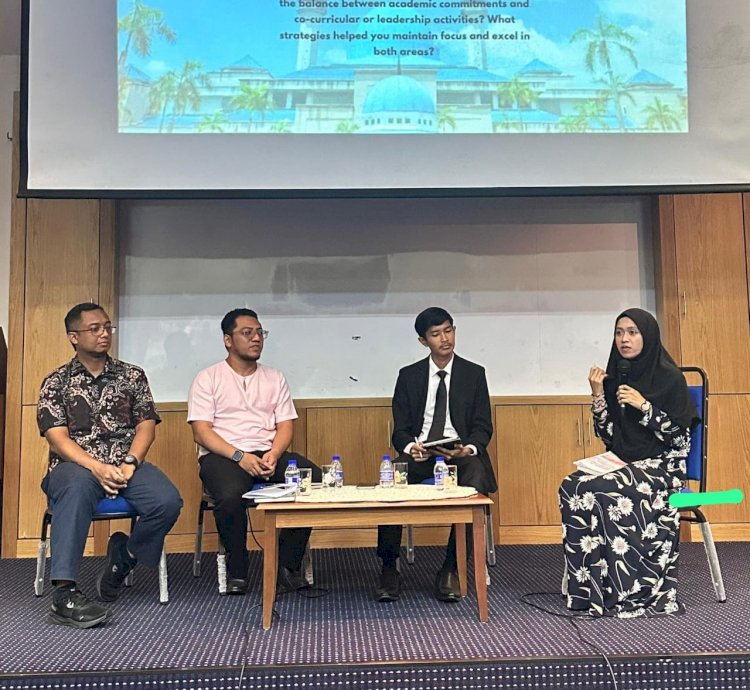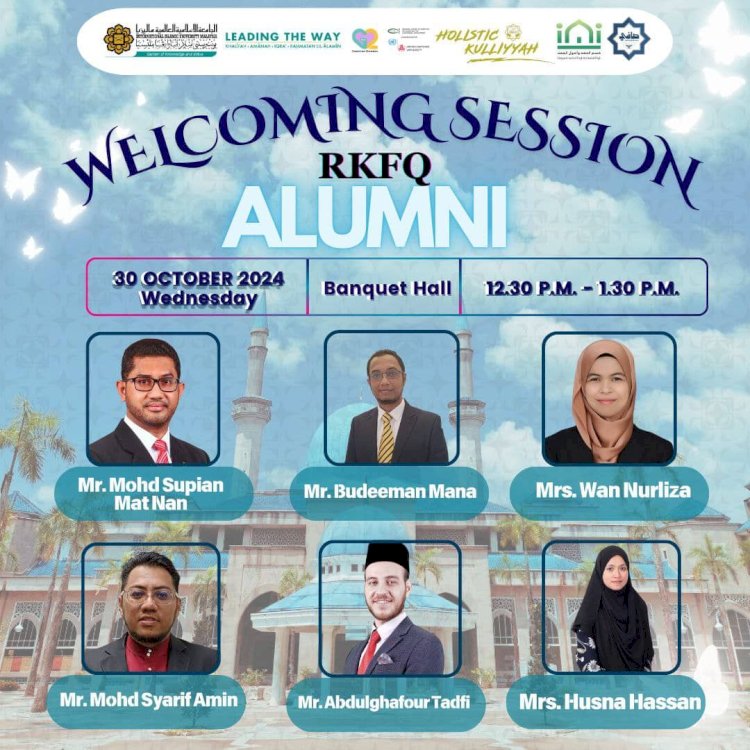FOSTERING FUTURE LEADERS: INSIGHTS FROM RKFQ ALUMNI MEET STUDENTS DAY AT IIUM
The AbdulHamid AbuSulayman Kulliyyah of Islamic Revealed Knowledge and Human Sciences (AHAS KIRKHS), in collaboration with the Secretariat of Fiqh and Usul al-Fiqh (SOFI) IIUM 23/24 organized an inspiring Alumni Meet Students Day program on Wednesday, October 30, 2024, at the ADM LT4, IRK Building, IIUM Gombak. This enriching session brought together distinguished alumni who have achieved remarkable success in their personal and professional lives, sharing invaluable insights with students in an engaging and casual setting.
The forum was conducted in two sessions, each featuring three accomplished panellists invited by the secretariat. The morning session was led by Mr. Budeeman Mana, Shariah Chapter Lead of Strategic Programme at Maybank Islamic Berhad; Mr. Mohd Syarif Amin, Head of Shariah Review at Ambank Islamic Berhad; and Mrs. Husna Hassan, an Acquisition Editor and Author at Telaga Biru.
In the afternoon session, the forum welcomed Mr. Mohd Supian Mat Nan, Head of Shariah at Public Islamic Bank Berhad; Mrs. Wan Nurliza, Manager of Shariah Research, Governance & Training at Bank Rakyat; and Mr. Abdulghafour Tadfi, an Education Service Officer at Majlis Agama Islam Wilayah Persekutuan (MAIWP).

The forum focused on time management strategies and advice for students transitioning into the workforce. Speakers shared their experiences in university and industry, highlighting the importance of effective time management. They offered valuable tips to help 3rd, and 4th-year students prepare for their future careers. Here what can we analysed from the insightful sharing from each speaker:
TIPS ON MANAGING TIME
1. Set clear goals
Speakers emphasized the importance of setting clear goals before starting any task or work, especially for students in balancing multiple responsibilities. Academic success should remain the primary focus for students, but engaging in extracurricular activities can be beneficial for personal growth and networking. To achieve a balance, students should define their goals, prioritize their commitments, and understand the desired outcomes of each activity. By doing so, they can maximize their university experience while staying aligned with their academic and personal objectives.
2. Prioritize the most important tasks
The speakers employ a relatable analogy; just as you mix rice and chicken on your plate for a balanced meal, you should prioritize and tackle tasks sequentially. By focusing on one task at a time and taking necessary breaks, you can effectively manage your time without feeling overwhelmed. This approach not only helps you in completing all your tasks but also ensures that you prioritize the most important ones, leading to a more productive and less stressful day.
3. Stay focused
To enhance focus and time management, pre-class preparation is crucial. Reviewing materials beforehand boosts concentration and reduces stress during lectures. Engaging in small group discussions further reinforces understanding and active participation. These strategies lead to more efficient studying, better exam preparation, and ultimately, improved academic performance.
4. Be a manager of yourself
The Qur'an (103:1-3) underscores the significance of time management, emphasizing the need for personal responsibility in utilizing it wisely. While various time management techniques exist, it's crucial to find a personalized approach that aligns with individual needs and goals. By prioritizing tasks, exercising discipline, and cultivating self-awareness, individuals can effectively manage their time, leading to increased productivity and fulfilment in both personal and professional endeavours. Being a manager of yourself requires discipline, self-awareness, and a commitment to prioritize tasks based on their importance and urgency. By taking ownership of your time and recognizing its value, you can make meaningful progress in your personal and professional life while staying mindful of your ultimate purpose.
TIPS ON WHAT TO PREPARE FOR JOB ENVIRONMENT FOR FUTURE GRADS
1. Set clear goals
To effectively set goals for your job search, define clear and specific objectives. Identify the ideal job role, industry, and desired salary. Create a realistic timeline with actionable steps, such as tailoring resumes, networking, and applying to specific positions. Regularly track your progress and adjust your strategy as needed. Maintain a positive mindset and celebrate small victories to stay motivated throughout the process.
2. Enhance multiple soft skills
Acquiring a diverse range of soft skills, such as communication, leadership, writing, and technical proficiency, is crucial for future success. These skills, often not explicitly taught in the classroom, are developed through practical experiences like joining societies, clubs, or participating in extracurricular activities, which help graduates hone leadership abilities, teamwork, and public speaking. Additionally, knowing how to craft a compelling resume and cover letter is equally vital but often overlooked by students. A well-prepared resume, paired with a tailored cover letter, significantly enhances a graduate's chances of standing out in a competitive job market. Employers value candidates with strong interpersonal, problem-solving, and adaptability skills, and a polished application package helps showcase these attributes effectively. By actively working on both their soft skills and job application materials, graduates can build a strong foundation for their careers.
3. Grab any opportunity
Get latest information, be curious asking questions, read more, taking more networking, keep yourself up to date because seizing opportunities is essential for preparing yourself for the competitive job market. To thrive in today's competitive job market, stay proactive and curious. Continuously seek new information, ask insightful questions, and read widely to stay informed about industry trends. Network with professionals, attend events, and expand your connections to gain valuable insights. Prioritize lifelong learning by upskilling and adapting to technological advancements. By embracing these proactive strategies, you'll enhance your employability, demonstrate your commitment to growth, and position yourself for success in the evolving job landscape.
4. Step out of your comfort zone
Stepping outside your comfort zone is crucial for personal and professional growth. By taking on new challenges, such as public speaking or leading projects, you develop resilience, adaptability, and valuable skills. These experiences expose you to real-world situations, fostering your ability to handle uncertainty and embrace new opportunities. Remember, every challenge is a chance to learn and grow, so don't hesitate to step outside your comfort zone and unlock your full potential.
As we conclude this enriching alumni forum, we're grateful for the invaluable insights shared by our esteemed alumni. Their experiences and wisdom have equipped us with practical tools to navigate our academic journey and future careers. Remember, effective time management is the cornerstone of success. Prioritize tasks, utilize time management techniques, and create a conducive study environment. As you embark on your professional journey, embrace challenges as opportunities for growth, network with industry professionals, and continuously upskill yourselves. By applying these valuable lessons, we can confidently step into the future, armed with the knowledge and skills to excel in our chosen fields. Let's express our sincere gratitude to our alumni speakers for their inspiring words and guidance.
About the author:
- Nurul Aufa Muhammad Khairi is a 3rd year student of IIUM and currently specializing in Fiqh and Usul al-Fiqh.
- Nur Ain Adlina Anuar is a final year student also at IIUM and currently pursuing her study in Fiqh and Usul al-Fiqh.
- Assistant Professor Dr. Fatimah Karim who is Academic Advisor of Department Fiqh and Usul al-Fiqh, AHAS KIRKHS IIUM.
Disclaimer
The views expressed in this article are the author’s own and do not necessarily mirror Islamonweb’s editorial stance.
























Leave A Comment